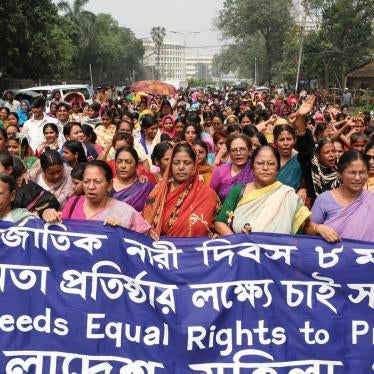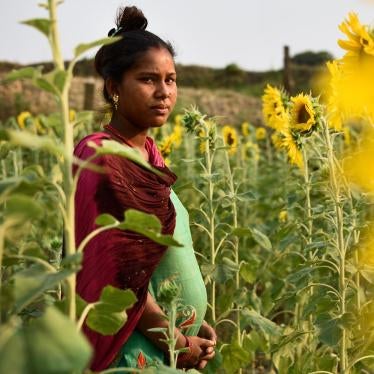When Namrata, a Bangladeshi Hindu, asked for a glass of water, her husband instead gave her a glass of acid. Today, with her mouth and throat destroyed, she eats through a feeding tube. Having already spent her life savings, her husband disappeared after the attack.
Yet Namrata cannot legally divorce her husband due to Bangladesh’s archaic Hindu family laws.
Bangladesh’s family laws, which govern marriage, separation, and divorce, were created decades ago – in some cases, more than a century. There are separate laws for Muslims, Hindus, and Christians, but all discriminate against women – often leaving them with virtually no income or assets and nowhere to live when marriages end.
These laws trap women like Namrata in abusive marriages. And if their marriages fall apart, women often fall into poverty, sometimes going homeless and hungry.
Bangladesh is famous as the cradle of microfinance and banking services, like small-business loans, for people with few assets.
But what is less well-known is that Bangladesh’s archaic family laws push women into poverty if marriages end. Many families don’t consider that possibility but instead see marriage as a form of economic security for their daughters – part of the reason more than 55 percent of girls and women in Bangladesh over age 10 are married.
Women and girls contribute in many ways to their family home – they cook and clean, raise children and care for in-laws, work in the fields or help run family businesses. But family laws are blind to this. When marriages end, men typically keep homes and family property, while women are forced out with virtually nothing. The United Nations has identified “marital instability” as a key cause of “ultra and extreme” poverty among female-headed households in Bangladesh.
Our report, ‘Will I Get My Dues…Before I Die?’, shows the damage these laws can cause and how they deny women their economic rights.
Namrata, the Hindu woman whose husband gave her acid to drink, is subject to Bangladesh’s Hindu laws. These laws do not allow for divorce, and they make it difficult for a woman to get maintenance payments from her husband – even for food or essential clothing. The laws do, however, allow men to have multiple wives, making divorce almost irrelevant for them. But divorce is devastating for women.
The majority of Bangladeshis are Muslim. Muslims may legally divorce, but while a man has an automatic right to no-fault divorce, his wife has that right only if the husband asks to have it included in their marriage contract. Alternative routes to divorce are time-consuming, expensive, and difficult. The laws also allow polygamy for men, but not women. If a couple does divorce, the woman can only receive maintenance payments from her former husband for 90 days, and even those payments are hard to secure in family courts.
Shefali S., a Muslim, lived with her husband and in-laws. She worked in the family’s fields and did all the household work. When she was pregnant with their first baby, she learned of her husband’s plan to remarry and confronted him. He kicked her and forced her to stand naked throughout a cold winter night as punishment. He once beat her to the point of unconsciousness. Eventually he abandoned her and remarried. Shefali felt trapped. She knew she had little hope of receiving money from her husband, and her parents couldn’t support her.
She continued living with her in-laws, enduring their beatings.
In Christian personal law, divorce is allowed, but is also much easier for men to obtain. A man only needs to prove that his wife committed adultery. A woman, on the other hand, must prove adultery plus other acts – like his conversion to another religion, bigamy, rape, bestiality, sodomy, or abandonment.
Legally under Christian laws, wives are entitled to maintenance from their husbands. But dysfunctional family courts mean that women have to wait months or years for results.
In a step in the right direction, Bangladesh passed a law against domestic violence in 2010, which gives female victims an equal right to reside in the matrimonial home. Important as this reform is, it is a far cry from legal recognition of women’s equality in marriage and at its end.
Bangladesh does have social programs for women whose husbands cannot afford to support them. One program, for example, entitles “husband-deserted” women to payments of 300 takas (US$4) per month. However, most of the 120 women we interviewed knew nothing of these programs.
We are working closely with Bangladesh’s women’s rights groups to advocate change in these laws and family court procedures, and to link poor women to social protection programs. Seven leading women’s rights and human rights groups issued a strong statement calling for these reforms in September. Together, we are pushing for change with the Bangladesh government, Law Commission, and donor countries.
These laws need to change. It is bad enough that women have little protection if their marriages break down. But it’s even worse if a woman, like Namrata, can’t divorce a husband who destroyed her life.

